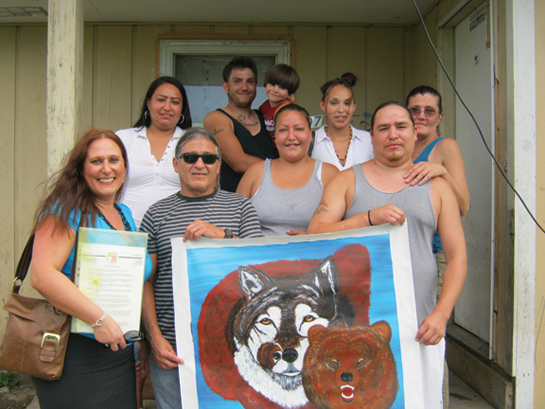
Family lobbies for justice. Front row, from left: Anna James holds a copy of the Yankton Sioux Tribe resolution on behalf of four tribal members — Jesse and Desmond Rouse, Garfield Feather, and Russell Hubbeling — while their cousin James Weddell and Jesse’s son Moses hold a painting Jesse created as a gift to the tribal council. Middle row: nieces Rosemary and Thrista Rouse and Jesse’s ex-wife Lory Rouse. Back row: Jesse’s son Christopher and his son (Jesse’s son and grandson) and niece Lucricia Rouse. Photo courtesy Anna James.
MARTY, SOUTH DAKOTA -- On July 20, the Yankton Sioux Tribe passed a resolution requesting that the U.S. Attorney General review a federal-court conviction of four tribal members on childhood-sexual-abuse charges. “We believe that these four men are innocent of all charges against them and that their trial was fatally tainted by serious error,” reads the document, which suggests that the men be either freed or retried. Major supporters included Chairman Robert Cournoyer, Secretary Rachel Bernie, Treasurer Leo O’Connor (Hubbeling’s father), and Business and Claims Commission member Myron Turner. The resolution will be delivered to U.S. Attorney General Eric Holder at a meeting this week in Rapid City, South Dakota, and sent to his office. Accompanying it are letters from experts who point to judicial irregularities in the 1994 trial of brothers Jesse and Desmond Rouse and their cousins Russell Hubbeling and Garfield Feather. So far, the men have served 17 years of sentences that were as long as 30 years. The supporting letters are from Robert Chatelle, executive director of the National Center for Reason and Justice, which works to exonerate those wrongfully convicted of harming children, and from two authorities on children’s testimony: forensic psychologist Hollida Wakefield and Johns Hopkins Medical Institutions professor Maggie Bruck, Ph.D. Chatelle’s letter stressed civil-rights and due-process violations in the trial, including racist remarks by “at least one member of the defense team,” intimidation of defense witnesses, and evidence crucial to the defense that the judge did not allow the jury to hear. Chatelle, Wakefield, and Bruck all noted problems with the interviews of the men’s nieces and nephews – the alleged victims – which appear to have contaminated the youngsters’ memories from the very start of the proceedings. “Results of 50 or more studies [show] that when children are suggestively interviewed about events that never occurred, they can come to make false allegations,” Bruck wrote to Holder. The three experts’ opinions are shared by prominent investigator Martin Yant, whose independent review of the trial and evidence helped convince NCRJ to take up the men’s cases. Concerns about coercive interviewing arose as early as 1996. In a majority opinion for the men’s successful appeal – which the U.S. Attorneys’ Office then got the same court to reverse – Judge Myron H. Bright noted that the alleged victims, who were aged 4 to 7, were interviewed by intimidating teams of as many as four adults, including an FBI agent and a BIA agent who identified themselves as “like a policeman.” According to the judge, the questioners showed the youngsters anatomical drawings of a penis; “helped” them remember abuse; gave them group “therapy,” during which they encouraged the children to talk about sex; and made it clear the kids wouldn’t go home unless they agreed with their questioners about “the truth.” “Sick” was Desmond Rouse’s assessment of the interviews: “FBI agent William Van Roe and BIA agent Dan Hudspeth had our little relatives for months [and] made them play in a dirty way with dolls with penises [and] draw dirty pictures. Someone needs to find those drawings. Or did they get rid of them?” What is known is that the FBI claims no one made audio- or videotapes of the sessions, which Wakefield called “unusual.” The children may never have fully understood what was happening. According to Desmond Rouse and one of the alleged victims (now an adult), some of the kids waved at their uncles when they saw them in the courtroom; while the kids were being questioned over closed-circuit television in a separate room, they got excited about seeing the four men “on TV.” However, the youngsters do appear to have figured out that they had to answer “yes” to the prosecutors’ yes-no questions if they wanted to return to their mothers. Their families, in turn, were warned by the prosecution not to cooperate with the defense if they wanted to get their children back, said Roderica Rouse, who is Desmond and Jesse’s sister and the mother of an alleged victim. The tribe’s and experts’ documents in support of the men, along with a grant application to the Shakopee Mdewakanton Sioux Community to help pay for a lawyer, came together after a whirlwind trip to the reservation last week by Desmond’s fiancée, Anna James. James traveled from Great Britain, where she lives and works as an interpreter. “I love the other guys like brothers and asked them, ‘can I speak for all of you to the tribe?’” said James. “They said, ‘yes!’” When she arrived on the Yankton reservation, she found support among tribal officials, as well as among the men’s relatives, with whom she had been communicating. For many months, for example, James has spoken nearly daily by phone with Roderica Rouse. The four men’s cousin James Weddell helped James present her request to the tribal government. These days, Desmond Rouse and Anna James communicate constantly via email and see each other when they can. They’re hoping the four men’s convictions will be resolved shortly but are also trying to be realistic. “Whether it’s very soon or when Desmond’s sentence is up in ten years, we’ll be together,” she said. (Contact Stephanie Woodard at (718) 986-3571, swoodard2@gmail.com. Or visit www.huffingtonpost.com/stephanie-woodard)
Join the Conversation